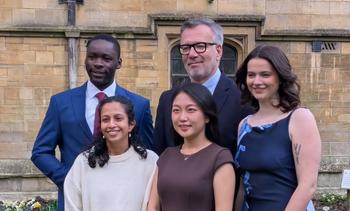Four George Mason University students from the Jimmy and Rosalynn Carter School for Peace and Conflict Resolution traveled to Oxford University’s Magdalen College in the United Kingdom with Carter School dean Alpaslan Özerdem for the 2025 Oxford Consortium for Human Rights (OCHR).
Billy Agwanda Nyadera, Anulina Sen, Hyoin Kim, and Avery Shippen attended the 2025 workshop “Human Rights in War and Climate Emergency” March 24 – 30, which explored the nature of modern warfare and the legal protections afforded to civilians, combatants, and detainees, as well as the science of climate change and its impact on humanity.

The workshop also examined the intersection of climate change and modern warfare, spotlighting the ramifications of combat on local environments. During the week-long event, the four students attended seminars on artificial intelligence (AI) and the impact of new technology, the use of religion in resolution tactics, mobilizing responses to build compassionate and just communities, and other topics.
“By joining this consortium, the Carter School offers its students a truly once-in-a-lifetime opportunity. Not only do they get to collaborate with peers from other leading U.S. universities, but they also engage in a transformative learning experience guided by distinguished scholars from the University of Oxford,” Özerdem said. “Studying and living in Oxford—even for just one week—provides students with a unique and inspiring environment that fosters intellectual growth, enhances self-confidence, and broadens their academic horizons.”
“This immersive experience also significantly strengthens their professional development and employability prospects after graduation, equipping them with the global perspective and collaborative skills sought after in today’s competitive world,” he added.
Sen, a master’s student at the Carter School, found the setting and the dialogue inspiring. “The Oxford Consortium has clarified my research, showed me possibilities in this field and led to unexpected conversations that challenged my views.”
"Attending the Oxford Consortium deepened my understanding of the intersection between war, climate emergencies, and human rights, said Kim, a conflict resolution student at the Mason Korea campus who put what she learned into practice upon returning to campus. “I immediately turned my insights into action by organizing a campus event where students could share actions for peace through storytelling."
The students found the seminars to be of immense value to their own research as well as to their understanding of the modern conflict, the threat of climate change, and the crossover of the two areas of research and their impact on human rights.
"I saw and experienced the fusion of minds and hearts in pursuit of solutions to some of the most pertinent issues facing our societies today,” said Nyadera, a Carter School doctoral student. “I feel profoundly grateful for the opportunity to participate and contribute to this pioneering program to connect Carter School student community with global conversations and networks. OCHR has been a true catalyst for my own work."
Shippen, an undergraduate student at the Carter School and the Honors College, also appreciated the opportunity the conference provided. “It helped me better understand the connection of human rights, war, and climate emergencies, as well as how I can help address these topics as a student,” Shippen said. “As someone passionate about global education, it was inspiring to learn from professionals and faculty who care deeply about human rights and the way they intersect with global challenges."
In This Story
Related News
- October 17, 2025
- September 17, 2025
- May 30, 2025
- April 21, 2025
- March 17, 2025
